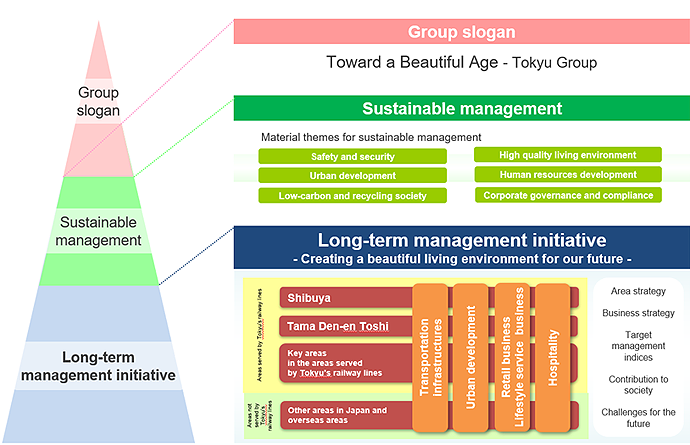Tokyu Corporation (hereinafter "the Company") has recently prepared that it has formulated a long-term management initiative, which shows its management stance, area strategy, business strategy, and other aspects for the period until 2030 (hereinafter, the “Initiative”).
Since the Company foundation, we have been striving to resolve social issues through urban development based on the railway business. The Company is currently working on medium-term management plan (FY2018 to FY2020) under the slogan of “Make the Sustainable Growth.”
The plan sets out three basic policies: sustainable urban development, sustainable corporate development and sustainable HR development. Under these policies, the Company pursues safety, security, and comfort in its railway business, steady progress in large-scale development projects aimed at increasing SHIBUYA’s global appeal, the improvement of the value of the areas served by Tokyu’s railway lines and lives of people in those areas through demonstrating the comprehensive strength of the Group’s businesses, business expansion through strategic alliances, and others.
In this environment, the Company changed the existing Japan trade name, which has been used for more than 70 years, in September 2 , and split the railway business , in October 1.
The Company formulated a long-term management initiative in the belief that it is time to work quickly on the enhancement of the group management system, including the split of the railway business divisions, and clearly indicate Tokyu’s visions for the future and the direction in which Tokyu will go.
In formulating the Initiative, the Company reaffirmed that the group slogan, “Toward a Beautiful Age - Tokyu Group,” is a universal standard of value, and set “Creating a beautiful living environment for our future” as the subtitle.
The Company will work to achieve both the resolution of social issues and the growth of the business by combining area-specific strategies reflecting the characteristics and growth potential of the individual areas, including those outside the areas served by Tokyu’s railway lines, and strategies specific to businesses including transportation infrastructures, urban development, and the lifestyle service business, while also squarely addressing the material themes for sustainable management, which the company formulated in consideration of the present and future changes in the social environment and with awareness of the SDGs and other aspects.
The Initiative also includes a chapter entitled “Challenges for the Future,” which shows Tokyu’s visions for the future (visions for 2050) to be achieved the development of “A City Adored by People around the World’ by providing social values originally created by Tokyu as a company with a wide range of business domains.
The overview of the Long-Term Management Initiative is described as follow

- Shibuya
Improving the attraction from the area-face viewpoint of Greater SHIBUYA by continuing the company’s strategy of focusing on Shibuya
Making Shibuya evolve through the development and enhancement of infrastructures incorporating urban development and railways development
Further evolution and deepening of “Entertainment City SHIBUYA”
- Tama Den-en Toshi
Integrally exerting the total power of the Company’s businesses (railway, real estate, and life services) to produce advanced cases of solutions to problems in suburban areas
Activating the city and promoting reverse transportation in the railways by strategically arranging functions such as “work, life, and play” in the development of business bases
- Key areas served by Tokyu’s railway lines
Actively acquiring and creating business opportunities in areas where further growth and development is expected
- Areas outside the areas served by Tokyu’s railway lines
In Japan: Taking advantage of the increase in inbound tourists and the exchange population increase due to the increased demand for holiday attractions by Japanese people
Overseas: Business expansion through strategic alliances within the Tokyu Group and with outside companies and urban development using the group’s expertise in this area
- Transportation infrastructure business
Pursuing safety in railway business; realizing both public welfare and profitability at a high level
Creating next-generation transportation infrastructure businesses with the airport operation business and the MaaS business as the core
- Urban development business
Solving social issues and achieving business growth by promoting urban development that is unique to the Tokyu Group
Evolving from the real estate business to urban management by using IT and exhibiting the total power of the Tokyu Group through cooperation with a range of business segments
- Lifestyle Service business
Enhancing the competitiveness of each individual business; pursuing synergy with the real estate business
Implementing management that is oriented toward consumers and users ahead of diversified customer needs and changes in people’s lifestyles
- Retail business
Conversion of the business structure and improvement of profitability through cooperation among the Tokyu Group and alliances with companies outside the Group
Provision of new experiences to customers and improving productivity by introducing new technologies
- Hospitality business
Increasing the competitiveness of hotel business
Cooperation with the Urban Development and development of businesses that respond to diverse lifestyles
Restructuring of the value chain and the supply chain that are responsive to changes in the environments
Expanding the profit scale through actively making investments.
Profit attributable to owners of parent : 100 billion yen .
[Numerical targets]
(Billion yen)
|
Result for FY2018 |
Target for FY2030 |
|
|
TOKYU EBITDA* |
176.6 |
300.0 |
|
Profit attributable to owners of parent |
57.8 |
100.0 |
|
(Reference) Operating profit |
81.9 |
150.0 |
|
Interest-bearing debt/TOKYU EBITDA Multiple |
6.0 |
5.0 or around |
- Operating profit + Depreciation + Amortization of goodwill + Disposal cost of fixed assets + Interest and dividend income + Investment gains (loss) from the equity method



